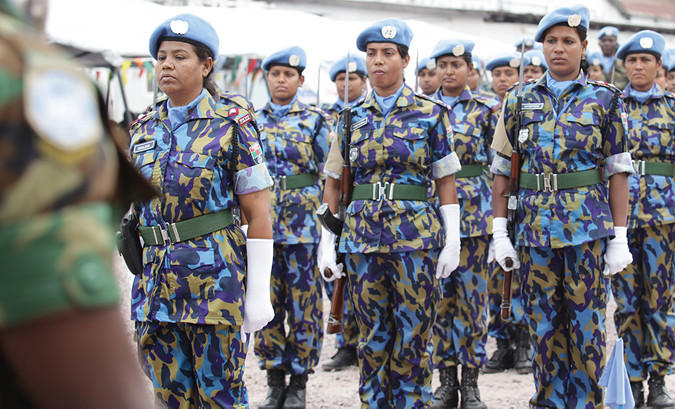Why I went to the Democratic Republic of Congo
Date:
Author: Roshni Kapoor
It is now fifteen years since the United Nations Security Council Resolution (UNSCR 1325) on women, peace and security. The resolution reaffirmed the role of women and their equal participation and full involvement in the prevention and resolution of conflicts, peace negotiations, peacekeeping, and in post-conflict reconstruction. The resolution urges all actors to increase the participation of women and incorporate gender perspectives in all United Nations peace and security efforts.

Despite the advancements over the last 15 years, the focus on women’s roles as peacekeepers has been limited. There are still only about three percent of women in the military and ten percent in the police. Bangladesh is one of the few countries with a long history of deploying peacekeepers and has been a leading contributor of female troops, with the majority sourced from the police service.
Aditi * who served in the Democratic Republic of Congo (DRC) as part of the Formed Police Unit (FPU) from Bangladesh provides insights into the important role that women peacekeepers play.
Q: What was your motivation to serve as a part of Bangladesh’s FPU to the UN peacekeeping mission?
A: My motivation came from wanting to develop my career, gain international exposure, and to use my training and skills as a police officer in Dhaka in another setting. In Dhaka, I have been working in the riot control team, and this came in handy in the DRC.
Q: Are there any particular challenges you faced there?
A: Language was a challenge. I took some French lessons in Bangladesh. It was not much, but saying “Bonjour” with a smile goes a long way in building trust. We did all kinds of jobs -from patrolling to security to VIP personnel – the hours were long and the job was tough. But we were as well-trained as the male troops and we stood alongside them.
Q: The FPUs from India to Liberia in 2007 and Bangladesh to Haiti in 2010 are lauded for their presence and performance, in particular in reducing sexual and gender-based violence. Do you think the all-female FPUs are better than male FPUs in addressing gender-based violence?
A: In DRC, we were greeted us as the ‘sexual violence-solving force’ or they said “the women are here to save the women”. There seemed to be an understanding that we were there to solve this issue. This was surprising, because I wondered who was doing it before the all-female FPU came, and who is going to do my other policing duties. But our FPU did develop a close relationship with the gender team in the mission. And we did get called on. I was the first one to get called by male troops patrolling at night if there was a threat of gender-based violence or an incident was reported, as they thought it was our job. In some villages, the women accepted us easily. Our sisters from Bangladesh had served before us, so we were already known and they called us ‘Bangla mama’.
There are many roles that men and women can perform in peacekeeping, and we have to allow all qualified men and all women to come and serve in the mission. Some men told me that they had training in dealing with gender-based violence, but they never got a chance to use it. On the field it should not be a man versus woman issue.
Q: Although Bangladesh is one of the largest contributors of troops to UN peacekeeping forces – especially female troops – overall the number of women in peacekeeping is very low. Why do you think that is?
A: There are very few women in the police and military. But within the police and military, if you ask anyone, they all want to serve in peacekeeping. It is a matter of pride and exposure. We are all married and have a husband and sometimes children. Many would think this is a reason not to go, but in Bangladeshi culture we have a much stronger social network – my mother, my mother-in law will always step in to help. But there is not enough paid leave and the flight home is expensive. It is easier to serve once, but many don’t go back again.
Q: As more women enter peacekeeping, is this changing people’s mindsets and attitude about women’s roles in peace and security?
A: We are not just victims. We are police officers, and mothers and wives. I am proud of my work in DRC and for all the recognition my contingent, my country and myself are getting.
* name changed for privacy